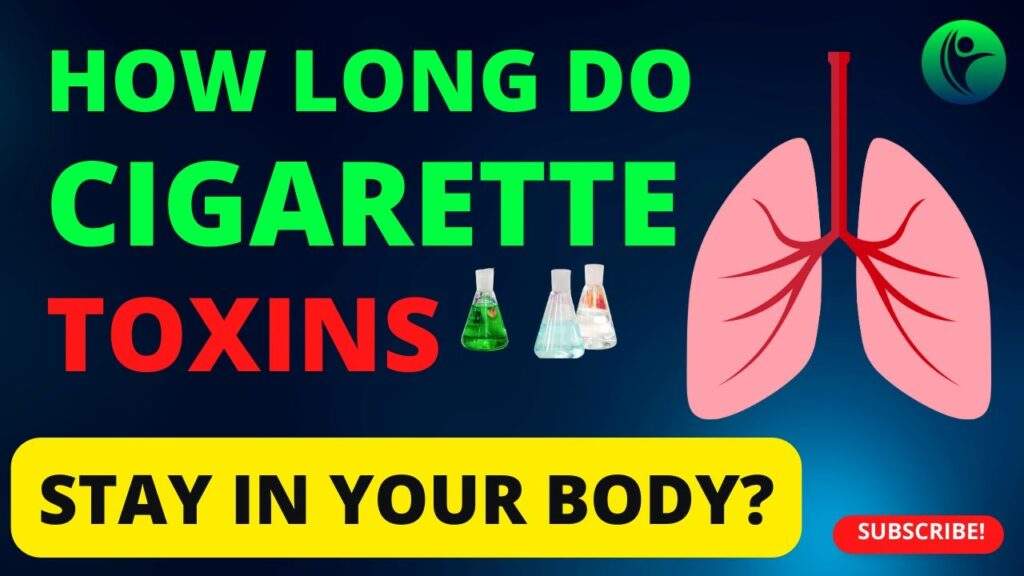This video talks about how long nicotine and other cigarette toxins stay in your body.
When you smoke, you take in Nicotine and other toxins. How long do Nicotine and toxins from cigarette smoke stay in your system? ……….and how long does it take for you to get rid of them? Let’s talk about Nicotine and 5 other chemicals you consume when you smoke.
Several people ask how long it takes for their bodies to get rid of the toxins from cigarette smoke. You may be thinking of quitting smoking and wondering the same. Perhaps, you’ve quit smoking but wonder how long it will take for you to get rid of all the toxic chemicals from cigarette smoke.
It may also well be that you have to be tested for the components of cigarette smoke because you are applying for a job, health insurance or even in preparation for surgery. Whatever your reason, I’m sure you are curious to know how long Nicotine and other toxins stay in your body.
It is important to know that your body has the potential to heal itself to an extent. This means that simply stopping cigarettes gets you on the path to self-healing.
Let’s talk about Nicotine first, and then we’ll talk about some other chemicals found in cigarette smoke.
Nicotine is a chemical which is responsible for the addictive effects of cigarettes. It has a half-life of about 2 hours. The half-life of any substance is the amount of time it takes for half of that substance, that is 50% of it, to be removed from the body. What this means is that Nicotine has a very short half-life and 50% of it is cleared from your body in about 2 hours after smoking. It takes about 3 to 5 days on average for all the Nicotine to leave your system. This is one of the major reasons you find the withdrawals to be most uncomfortable within the first 5 days or so.
Even though Nicotine leaves your body in 3 to 5 days on average, urine testing can still show you recently smoked cigarettes. The reason for this is that your body breaks down Nicotine to another chemical called Cotinine which is passed out of your body in urine. Your urine can test positive for Cotinine as long as 2 to 3 weeks after you quit smoking.
In addition to Nicotine, studies show that cigarette smoke contains over 4,000 chemicals. Let’s talk about some of these chemicals and how long they stay in your body after you stop smoking. To make sure I’m giving you accurate information, I’ve obtained these from the Centers for Disease Control and Prevention website, that is the CDC, and other reputable sources.
It is important to note that people are different and may respond to exposure to these chemicals differently. Generally speaking though, response to these toxins depends on how long you have been exposed, how much you take in, how they combine with other chemicals in your body, and your overall health.
Let’s talk about 5 of these chemicals.
Number 1. Cadmium. Cadmium is used to make batteries, fertilizer, plastics and metal coatings. The tobacco plant avidly takes up cadmium from the soil. In addition to damaging your lungs, cadmium may build up in your kidneys and cause kidney disease and fragile bones. Cadmium is considered a cancer-causing agent. Long term accumulation of cadmium can overload your liver and kidneys and remain in your body for many years.
Number 2. Arsenic. Arsenic has been used to make rat poison and other pesticides, paint, agricultural chemicals, glass, and wood preservatives. Long term exposure to arsenic can be harmful to the eyes, liver, kidneys, lungs and lymphatic system. Arsenic is changed in the liver and mostly removed from the body in urine within a few days. 2 to 4 weeks after exposure to arsenic stops, most of this chemical remaining in the body is found in hair, nails, skin, bones and teeth.
Number 3. Benzene. Benzene is a chemical with a sweet odor and it is made mostly from petroleum. It is also found in styrofoam, rubbers, dyes, detergents and pesticides. High levels of benzene can cause excessive bleeding, anemia and leukemia. The liver breaks down benzene into metabolites which are removed from the body in urine within about 48 hours.
Number 4. Formaldehyde. Formaldehyde is a chemical that is used to preserve dead bodies. It is responsible for some of the eye, nose and throat irritation you may experience when you smoke. Formaldehyde is not added to cigarettes. Rather, formaldehyde is produced when additives such as sugars, cellulose fibers and sorbitol in tobacco are burnt. Once in your body, formaldehyde is quickly broken down to other chemicals. Most of these other chemicals quickly leave your body in your urine.
Number 5. Carbon Monoxide. Carbon Monoxide is a dangerous chemical which can be found in car exhaust fumes. It is not added to cigarettes but this gas is produced when cigarettes burn. It gets into your blood and reduces the ability of your blood cells to carry oxygen.



